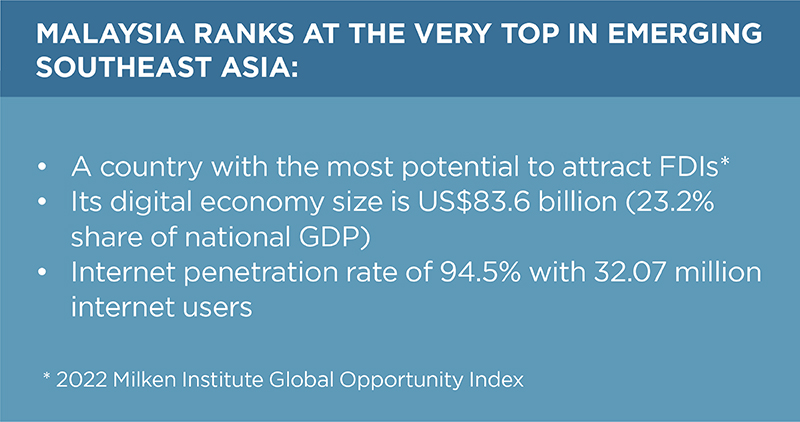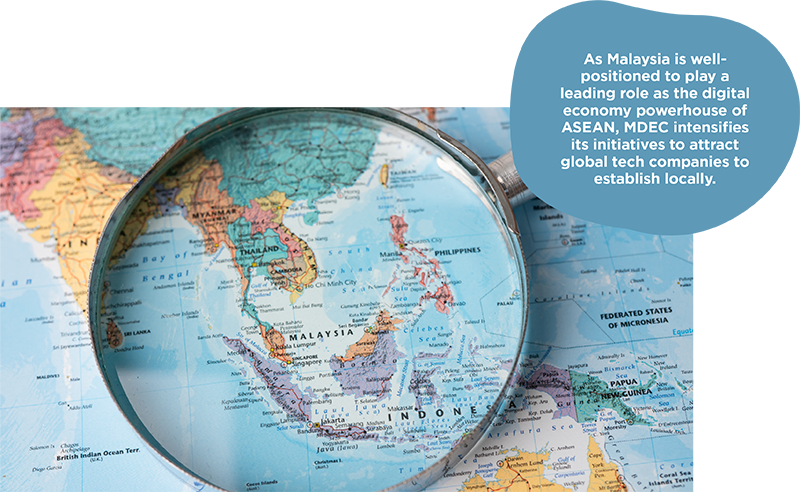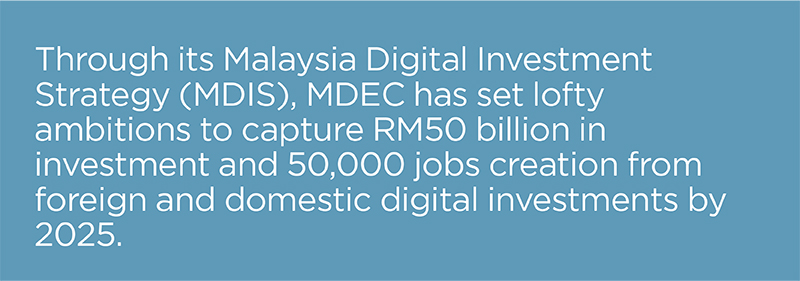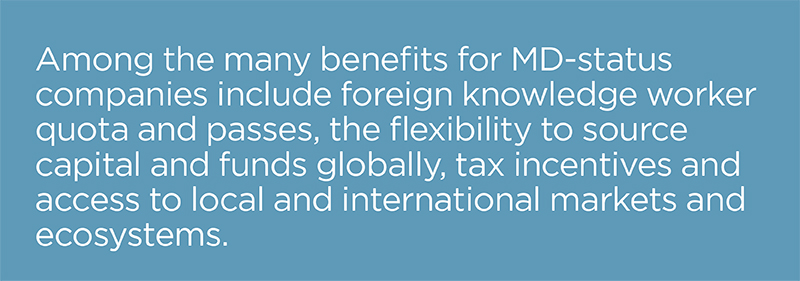Accessing A US$3.66 Trillion Economy: Strengthening Malaysia’s Position as the Digital Hub of ASEAN
By Raymond Siva - Senior Vice President, Digital Investment, MDEC

If the GDPs of all the ten member countries of the Association of Southeast Asian Nations (ASEAN) were combined, it would be valued at an estimated US$3.66 trillion in 2022, making ASEAN the fifth largest world economy, well on track to become the fourth largest by 2030. With a population of over 666 million, ASEAN is a key market for investors looking for growth and expansion. Despite the COVID-19 pandemic, ASEAN remains an attractive investment destination, having recorded foreign direct investments (FDI) inflows of US$174 billion in 2021, a 12% share of the global FDI.
At the heart of the region, Malaysia is well-positioned to play a leading role as the digital economy powerhouse of ASEAN.
Malaysia as the Digital Hub of ASEAN
Located strategically central in the ASEAN region, within just two hours by flight to major cities in ASEAN and eight hours from other growth economies, Malaysia is also free from severe natural disasters and supported by well-developed infrastructure, making the country a preferred location for business continuity for many MNCs and technology companies.
On top of having a vibrant democracy, there has also been a continuous push for digital transformation within the country, spearheaded by the strong track record of MSC Malaysia for over 25 years.

One of Malaysia’s strong value propositions lies in its diverse and robust talent pool. Malaysia’s multilingual, multiracial and digitally-savvy talent, coupled with its value-driven cost competitiveness, continues to draw global and regional investors to set up operations here. Malaysia’s top three ranking in the upper-middle income category in the INSEAD Global Talent Competitiveness Index 2022 and WIPO Global Innovation Index 2022 is a testament to the quality of the talent the country produces.
To ensure Malaysia has a robust and sustainable digital talent pipeline to support industry growth, the Malaysia Digital Economy Corporation (MDEC) is championing end-to-end talent and capability initiatives that span across programmes catered to school and tertiary students, as well as the existing workforce. These include the Let's Learn Digital upskilling programme, industry-academia collaboration through the Premier Digital Tech Institutions (PDTIs) and the #mydigitalmaker movement to transform Malaysian youth from digital users to producers in the digital economy.
Additionally, Malaysia boasts a mature and innovative digital infrastructure and ecosystem with its investor-friendly policies and numerous blueprints and strategies formulated to further address the growing needs of the digital ecosystem.
This includes the Malaysia Digital Economy Blueprint (MyDIGITAL) to transform Malaysia into a digitally-driven, high-income nation successfully, the National Digital Network (JENDELA) plan to enhance digital connectivity with wider broadband coverage and 5G rollout, and Malaysia Digital (MD).
MD is the new national strategic initiative by the government, building on the strong foundation established via MSC Malaysia - a national initiative established in 1996 towards transforming Malaysia into a leader in the knowledge-based economy. MD aims to encourage and attract companies, talents and investments while enabling Malaysian businesses and its people to play a leading part in the global digital revolution and digital economy.

Unlocking Values Amidst Global Headwinds
Global headwinds caused by geopolitical tensions such as the invasion of Ukraine, sanctions on Russia and China’s clampdown on tech companies, coupled with monetary tightening by central banks to fight inflation and market volatility concerns, have put pressure on the world economy. These events cause adverse impacts on various issues, such as the disruption of the global supply chain, energy and food security, mental and health well-being and the growing digital divide, giving rise to more focus on ESG by governments and businesses, as well as fiscal frameworks and support from governments around the world.
Despite the looming risks of global stagflation, ASEAN is poised for further stability and growth. The ASEAN-5 block, consisting of Malaysia, Indonesia, the Philippines, Thailand, and Singapore, is expected to outperform advanced economies, with a projected growth rate of 4.5% in 2023.
While the global growth rate continues to decline, Malaysia’s economic growth is projected to expand by 4% this year, supported by its policies of openness to trade and investment, robust digital economy frameworks, mature and skilled workforce, reliable digital infrastructure and strength as an offshoring location.
Capitalising on the opportunities that arise from the implications of the global headwinds, MDEC, as Malaysia’s lead digital investment promotion agency, is doubling down its efforts to attract digital technology companies from around the world to land in Malaysia and expand their operations in ASEAN, addressing solutions in Digital Agriculture, Digital Health, Digital Finance, Digital Cities, Digital Services, and Islamic Digital Economy.

Since the launch of Malaysia Digital in July 2022 until the end of March 2023, 145 companies have been awarded the MD status, garnering RM69.89 billion in new investment and creating 14,422 jobs. These MD-status companies produce and or utilise technologies and services in 10 specific technology enablers, namely data centre and cloud, cybersecurity, dronetech, blockchain, internet of things, robotics and automation, artificial intelligence and big data analytics, creative media technologies, advanced network connectivity and telecommunication technology, as well as integrated circuit design and embedded software.
Driving Investments with Malaysia Digital
With the ASEAN-led Regional Comprehensive Economic Partnership (RCEP) Agreement - the world’s largest regional trade agreement covering 30% of global GDP and world population - coming into force, opportunities abound for trade and investment. The adoption of the ASEAN Digital Masterplan 2025 also paves the way for the region to be a leading digital community and economic bloc, further improving its regional integration and competitiveness in the global economy.
Together with Malaysia’s ratification of the Comprehensive and Progressive Agreement for the Transpacific Partnership (CPTPP), businesses and investors stand to benefit from these free trade agreements by locating and operating in ASEAN, making Malaysia a launchpad into the region.

The Malaysia Digital initiative is set to further bolster Malaysia’s attractiveness as the preferred investment location, accelerating the growth of the country’s digital economy.
With the Malaysia Digital status, eligible companies now have the flexibility and opportunity to operate, grow, expand or invest anywhere in the country. MDEC, as the high-powered implementation agency of Malaysia Digital, provides both fiscal and non-fiscal incentives to MD-status companies.

Facilitating Digital Investments in Malaysia
ASEAN's digital economy is projected to reach US$2 trillion by 2030, and the sector is forecasted to contribute around 28% to ASEAN's GDP by then. Malaysia is strategically positioned right at the core of digital ASEAN.
As the nation’s specialist Investment Promotion Agency (IPA) in digital investment, MDEC is well-versed in facilitating and easing the entry of companies into Malaysia, supporting growth and expansion at all stages and as a springboard into ASEAN.
This article is an updated version extracted from Horizon, an MDEC publication providing a detailed perspective of Malaysia’s digital economy. Download your copy here - mdec.my/publications/horizon







